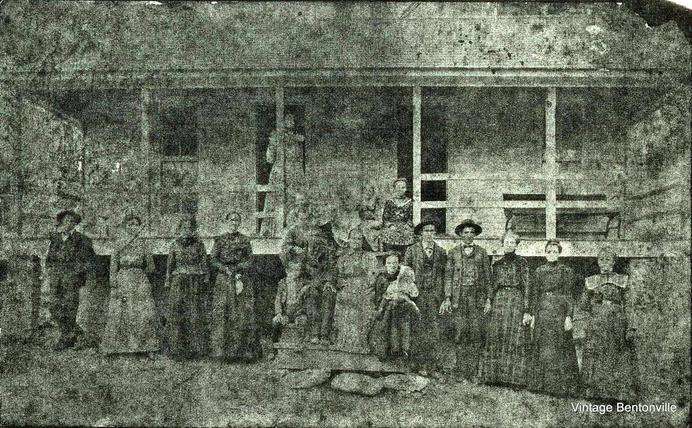
In many areas, poor families were auctioned off to the lowest bidder.
Benton, Clinton, Fairfield, Waterville, Winslow
This fourth and final article on the ways central Kennebec Valley towns carried out their responsibility to care for their poorest residents will provide bits of information about half a dozen towns not already discussed.
* * * * * *
For Benton (which was part of Clinton until March 16, 1842, when it became a new town named Sebasticook, changed to Benton on March 4, 1850), Henry Kingsbury had only one sentence about paupers: “The poor of the town have never been numerous, and are cared for [in 1892] by individual contract.”
In his Kennebec County history, he related an informal example. In the early 1800s, he wrote, a family named Piper proposed moving from Anson, Maine, to Ohio. As they were canoeing down the Kennebec, the canoe upset at Ticonic Falls, in Waterville, and the father drowned.
A second-generation Benton resident named Isaac Spencer rescued the Piper son, Joseph, “snugly wrapped in a blanket,” and brought him to his house. Joseph’s mother also survived, but she could not support her son, so he stayed with Spencer.
Kingsbury wrote that Joseph Piper “became a successful farmer.” He died in the 1850s, leaving a large estate on part of which a grandson named Charles was living in 1892.
* * * * * *
Kingsbury wrote that Clinton’s first poor farm, which existed before Benton and Clinton were separated in 1842, was “about half a mile west of Morrison’s Corner.”
Morrison’s Corner was, and as Morrison Corner still is, the four corners where Hinckley Road, running roughly north to south, meets Battle Ridge Road, which runs northeast to connect to Upper Bellsqueeze Road, and Ferry Road, which runs southwest to the former Noble’s Ferry on the Kennebec River.
By 1879, according to that year’s Kennebec County atlas, Clinton had a new town farm east of the original one, on the east side of Hill Road (which runs north-northwest out of downtown Clinton toward Canaan).
* * * * * *
Crossing back to the west side of the Kennebec, the 1988 Fairfield bicentennial history has no reference to a town farm, poor house or almshouse or any other town-funded method of caring for paupers. The first town meeting after the town was incorporated was on Aug. 19, 1788; the first reference to appropriations says that in 1793 “The Town first raised money for schools,” but lists no amount and mentions no other expenditures.
The history gives a short paragraph to what became the Goodwill-Hinckley School (described in the May 20 and June 3, 2021, issues of The Town Line). Rev. George W. Hinckley founded what started as Good Will Farm in June 1889, in the part of Fairfield now called Hinckley, “as a home for boys.”
In November 1889, the history continues, “the Good Will Home Association was organized as a home for needy boys with funds Rev. Hinckley had been collecting for some time.” The writers go on to describe 20th-century changes.
At the end of the bicentennial history is a reproduction of a 1909 map of Fairfield that shows a building labeled “Town Farm.” It is on the south side of a road running east from Green Road to Nye’s Corner, which is south – downriver, toward the Fairfield business district – of the Goodwill School.
A map from the mid-1980s shows the former road as a trail. It does not appear in any form on a contemporary on-line map.
(According to the 1909 map, the town farm was a short distance east of a four-way intersection where at least two families named Green lived. There was a schoolhouse on the east side of the intersection.)
* * * * * *
Waterville was part of Winslow from 1771 to 1802, and Oakland was part of Waterville until 1873, when it became a separate town called West Waterville (changed to Oakland in 1883).
Kingsbury explained that the growth of water-powered manufacturing on Messalonskee Stream, the outlet of Messalonskee Lake, led to the development of an industrial center separate from Waterville’s, which was based on and near the Kennebec.
Kingsbury’s accounts of poor farms in Winslow, Waterville and Oakland are frustratingly incomplete. As he often did, he assumed future readers would have access to the same documents he had, and would recognize the names of families, roads and localities that were part of his daily experience in the 1890s.
In his chapter on Winslow, he wrote that until 1859, paupers were bid off. That year, “the town voted $3,200, and bought the Blanchard farm.”
If the former Blanchard farm was still the town farm when the 1879 Kennebec County atlas was created, it was in a part of town more settled than officials usually chose for an almshouse.
The map shows the Town Farm on the west side of what is now Clinton Avenue (Route 100) running northeast along the Sebasticook River to Benton. The farm is marked about halfway between the top of the hill in Winslow and the Hayward Road intersection. Along this stretch, the map shows a dozen houses (occupied by, among others, several Getchell and Fuller families and two whose last name was Town) and a schoolhouse diagonally north of the town farm.
Kingsbury was slightly more informative on Waterville (unlike the Waterville centennial history; the summary of the 100 years from 1802 to 1902 doesn’t mention the poor, and since the book has a names-only index, finding any other reference is time-consuming).
In Waterville, Kingsbury found, the poor were bid off from 1811 (or earlier) until about 1842. In 1811, five paupers cost the town from 35 to 65 cents a week, for a weekly total of $2.59. In 1812, the town supported a dozen people and the cost went up to $3.48 a week.
(Ruby Crosby Wiggin’s comments about doctors’ fees, cited in last week’s article, suggest there might have been occasional additional charges.)
From 1837 records Kingsbury quoted a decision that the poor as a group “be sold at auction for one year.” Samuel H. Batchelder was the successful bidder, charging $865.
Around 1842, Waterville officials bought from Joseph Mitchell and George Bessey a 90-acre farm to use as a town farm. At an unspecified later date, the town also acquired a woodlot in Sidney, apparently intended to complement the farm.
The 1879 Kennebec County map shows Waterville’s town farm a short distance south of downtown, on the south side of Webb Road. It was just west of the intersection with Mitchell Road, which current maps show coming south from the back of LaFleur Airport to Webb Road.
In March 1890 the house on the town farm burned down. Officials then bought seven acres from George Boutelle and “built the present excellent city alms house at a total expense at $6,444.”
(George Keely Boutelle was a prominent Waterville lawyer and businessman who helped organize and lead several banks and was active in civic organizations.)
By 1892, Waterville’s “poor department” was costing more than $9,000 a year, Kingsbury added.
The 1873 separation of West Waterville (which became Oakland) from Waterville would have required the new town to assume the care of its indigent residents. The 1879 map of the new town shows a town farm not far west of downtown, on the north side of what is now High Street (Route 137 heading west toward Smithfield). Comparison with a contemporary on-line map puts the farm site about half-way between the Oak Street intersection and the Gage Road intersection.
Kingsbury provided evidence that in the early 1890s Oakland was both running a town farm and caring for paupers off the farm. Appropriations listed in a town report for the fiscal year that ended Feb. 28, 1892, included “support of poor,” $1,100 and “town farm,” $500.
A current on-line map labels the road along the east shore of McGrath Pond that connects Route 137 with Route 11 (the Oakland-Belgrade road) as Town Farm Road. A town farm on this road, if there were one, would have been west of the one in use in 1879.
Story of the Bray sisters
Did local methods of caring for the poor lead to those who were bid off to local families being turned into unpaid and mistreated farm and household help? Linwood Lowden said “without doubt” the system led to abuses; an on-line source says there is no evidence of abuse.
Your writer found one piece of writing that looks at bidding out from the paupers’ viewpoint: a short story by Sarah Orne Jewett called The Town Poor.
Two prosperous women in a small Maine town detour on their way home from a church event to visit two elderly sisters, Ann and Mandana Bray, who ran out of money and saw their house and possessions sold at auction and themselves bid out.
They live in a dingy upstairs room in a shabby farmhouse on a run-down farm. The couple with whom they live, named Janes, are not their social equals, and the complaining wife is not enthusiastic about sharing her house with two more adults. The sisters admit to their friends that they haven’t been to meeting because they lack outdoor shoes that their caretakers never remember to buy for them, nor do they have enough stovewood to keep their room warm.
But they bring out the four china teacups saved from the auction, the last of the homemade peach jam from the peaches that grew by their former house, tea and cheese and crackers. The friends have a warm reunion; and Ann says next time, she’ll invite Mrs. Janes, too; the woman means well and deserves cheering up, because she has a hard life and none of the happy memories the Bray sisters have.
See part 1 here.
See part 2 here.
See part 3 here.
Main sources
Fairfield Historical Society, Fairfield, Maine 1788-1988 (1988).
Halfpenny, H. E., Atlas of Kennebec County Maine 1879 (1879).
Jewett, Sarah Orne, A White Heron and Other Stories (1999 edition).
Kingsbury, Henry D., ed., Illustrated History of Kennebec County Maine 1625-1892 (1892).
Websites, miscellaneous.
 by Roland D. Hallee
by Roland D. Hallee






 Worcester Polytechnic Institute (WPI), in Worcester, Massachusetts, has announced that Alaina Lambert, of Winslow, a member of the class of 2026 majoring in biology and biotechnology, was named to the university’s dean’s list for academic excellence for the spring 2023 semester.
Worcester Polytechnic Institute (WPI), in Worcester, Massachusetts, has announced that Alaina Lambert, of Winslow, a member of the class of 2026 majoring in biology and biotechnology, was named to the university’s dean’s list for academic excellence for the spring 2023 semester. Springfield College, in Springfield, Massachusetts, recognizes the following local students for being named to the dean’s list for academic excellence for the 2023 spring semester:
Springfield College, in Springfield, Massachusetts, recognizes the following local students for being named to the dean’s list for academic excellence for the 2023 spring semester: Students at Lasell University, in Newton, Massachusetts, presented original research, creative works, and academic presentations at the annual Connected Learning Symposium in April 2023, including:
Students at Lasell University, in Newton, Massachusetts, presented original research, creative works, and academic presentations at the annual Connected Learning Symposium in April 2023, including:

